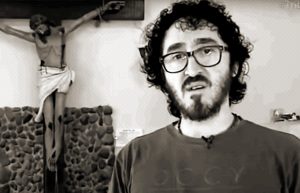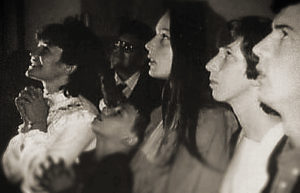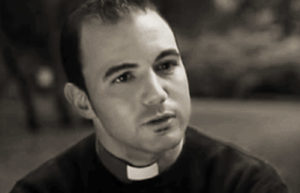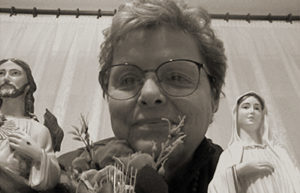Brothers and sisters: Strive eagerly for the greatest spiritual gifts. But I shall show you a still more excellent way…
Love is patient, love is kind.
It is not jealous, it is not pompous,
It is not inflated, it is not rude,
it does not seek its own interests,
it is not quick-tempered, it does not brood over injury,
it does not rejoice over wrongdoing
but rejoices with the truth.
It bears all things, believes all things,
hopes all things, endures all things.
Love never fails. —Sunday Second Reading
We are living at an hour when tremendous division is dividing even Christians — whether it’s politics or vaccines, the growing gulf is real and often bitter. Moreover, the Catholic Church has become, on its face, an “institution” riddled by scandals, financial and sexual, and plagued by weak leadership that merely maintains the status quo rather than spreading the Kingdom of God.
As a result, the faith as such becomes unbelievable, and the Church can no longer present herself credibly as the herald of the Lord. —POPE BENEDICT XVI, Light of the World, The Pope, the Church, and the Signs of the Times: A Conversation With Peter Seewald, p. 23-25
Moreover, in North America, American evangelicalism has fused politics with religion in such a way that one is identified with other — and these paradigms have somewhat spilled over to many other parts of the world. For example, to be a faithful “conservative” Christian is to supposedly be de facto a “Trump supporter”; or to protest vaccine mandates is to be from the “religious right”; or to espouse moral biblical principles, one is immediately conceived as being a judgmental “bible thumper”, etc. Of course, these are broad judgments that are every bit as wrong as assuming every person on the “left” embraces Marxism or is a so-called “snowflake.” The question is how do we as Christians bring the Gospel over the walls of such judgments? How do we bridge the abyss between us and the terrible perception that the sins of the Church (mine too) have broadcast to the world?
The Most Effective Method?
A reader shared this poignant letter with me on The Now Word Telegram group:
The readings and homily at today’s Mass are a bit of a challenge for me. The message, corroborated by present-day seers, is that we need to speak the truth despite possible negative consequences. As a lifelong Catholic, my spirituality has always been a more personal one, with an innate fear of speaking to non-believers about it. And my experience of Bible-bashing Evangelicals has always been to cringe, thinking that they are doing more harm than good by trying to proselytize people who are not open to what they are saying — their hearers are probably just confirmed in their negative ideas about Christians. I’ve always held to the idea that you can witness more by your actions than by your words. But now this challenge from today’s readings! Maybe I’m just being cowardly by my silence? My dilemma is that I want to be faithful to the Lord and our Blessed Mother in witnessing to the truth — both with regards to the truth of the Gospel and the current signs of the times — but I’m afraid that I will just alienate people who’ll think I’m a crazy conspiracy theorist or a religious fanatic. And what good does that do? So I guess my question is — how do you witness to the truth effectively? It seems to me to be urgent to help people in these dark times to see the light. But how to show them the light without chasing them further into the dark?
At a theological conference several years ago, Dr. Ralph Martin, M.Th., was listening to several theologians and philosophers debate on how to best propose the faith to a secularized culture. One said “Church teaching” (an appeal to the intellect) was best; another said “holiness” was the best convincer; a third theologian surmised that, because human reasoning has been so darkened by sin, that “what was truly necessary for effective communication with the secular culture was the profound conviction of the truth of faith that leads one to being willing to die for the faith, martyrdom.”
Dr. Martin affirms that these things are essential for the transmission of the faith. But for St. Paul, he says, “what primarily comprised his modality of communication with the surrounding culture was the bold and confident proclamation of the Gospel in the power of the Holy Spirit. In his own words”:
As for me brothers, when I came to you, it was not with any show of oratory or philosophy, but simply to tell you what God has guaranteed. During my stay with you, the only knowledge I claimed to have was about Jesus, and only about him as the crucified Christ. Far from relying on any power of my own, I came among you in great ‘fear and trembling’ and in my speeches and the sermons I gave, there were none of the arguments that belong to philosophy; only a demonstration of the power of the Spirit. And I did this so that your faith should not depend on human philosophy but on the power of God. (1 Cor 2:1-5, The Jerusalem Bible, 1968)
Dr. Martin concludes: “There needs to be sustained theological/pastoral attention paid to what the “power of the Spirit” and the “power of God” mean in the overall work of evangelization. Such attention is essential if, as the recent Magisterium has claimed, there needs to be a new Pentecost[1]cf. All the Difference and Charismatic? Part VI in order for there to be a new evangelization.”[2]“A New Pentecost? Catholic Theology and “Baptism in the Spirit”, by Dr. Ralph Martin, pg. 1. nb. I cannot find this document online presently (my copy may have been a draft), only this under the same title
…the Holy Spirit is the principal agent of evangelization: it is He who impels each individual to proclaim the Gospel, and it is He who in the depths of consciences causes the word of salvation to be accepted and understood. —POPE PAUL VI, Evangelii Nuntiandi, n. 74; www.vatican.va
…the Lord opened her heart to pay attention to what Paul was saying. (Acts 16:14)
The Interior Life
In my last reflection Stir Into Flame the Gift, I addressed this very thing and summarily how to be filled with the Holy Spirit. In the important research and documentation of Fr. Kilian McDonnell, OSB, STD and Fr. George T. Montague S.M., S.TH.D.,[3]eg. Open the Windows, The Popes and Charismatic Renewal, Fanning the Flame and Christian Initiation and Baptism in the Spirit—Evidence from the First Eight Centuries they show how in the early Church so-called “baptism in the Holy Spirit,” where a believer is filled with the power of the Holy Spirit, with new zeal, faith, gifts, a hunger for the Word, a sense of mission, etc., was part and parcel of newly baptized catechumens — precisely because they were formed in this expectancy. They would often experience some of the same effects witnessed countless times through the modern-day movement of the Charismatic Renewal.[4]cf. Charismatic? Over the centuries, however, as the Church has passed through various phases of intellectualism, skepticism, and ultimately rationalism,[5]cf. Rationalism, and the Death of Mystery the teachings on the charisms of the Holy Spirit and emphasis on a personal relationship with Jesus have waned. The Sacrament of Confirmation has become in many places a mere formality, much like a graduation ceremony rather than an anticipation of a profound infilling of the Holy Spirit to commission the disciple into a deeper life in Christ. For example, my parents catechized my sister on the gift of tongues and the expectation to receive new graces from the Holy Spirit. When the bishop laid hands on her head to confer the Sacrament of Confirmation, she immediately began speaking in tongues.
Hence, at the very heart of this ‘untying'[6]“Catholic theology recognizes the concept of a valid but “tied” sacrament. A sacrament is called tied if the fruit that should accompany it remains bound because of certain blocks that prevent its effectiveness.” —Fr. Raneiro Cantalamessa, OFMCap, Baptism in the Spirit of the Holy Spirit, conferred on the believer in Baptism, is essentially a child-like heart that genuinely seeks an intimate relationship with Jesus.[7]cf. A Personal Relationship With Jesus “I am the Vine and you are the branches,” He said. “Whoever abides in me will bear fruit much fruit.”[8]cf. John 15:5 I like to think of the Holy Spirit as the sap. And of this Divine Sap, Jesus said:
Whoever believes in me, as scripture says: ‘Rivers of living water will flow from within him.’ He said this in reference to the Spirit that those who came to believe in him were to receive. (John 7:38-39)
It is precisely these Rivers of Living Water that the world is thirsting for — whether they realize it or not. And that’s why a “Spirit-filled” Christian is of the utmost importance so that unbelievers may encounter — not one’s charm, wit, or intellectual prowess — but the “power of God.”
Thus, the interior life of the believer is of the utmost importance. Through prayer, intimacy with Jesus, meditation on His Word, reception of the Eucharist, Confession when we fall, recitation and consecration to Mary, spouse of the Holy Spirit, and imploring the Father to send new waves of the Spirit into your life… the Divine Sap will begin to flow.
Then, what I would say is the “pre-condition” for effective evangelization begins to be in place.[9]And I do not mean perfectly in place, since we are all “earthen vessels”, as Paul said. Rather, how can we give to others what we ourselves do not have?
The Exterior Life
Here, the believer must be careful not to fall into a kind of quietism whereby one enters into deep prayer and communion with God, but then emerges without true conversion. If the  world thirsts, it is also for authenticity.
world thirsts, it is also for authenticity.
This century thirsts for authenticity… Do you preach what you live? The world expects from us simplicity of life, the spirit of prayer, obedience, humility, detachment and self-sacrifice. —POPE PAUL VI, Evangelization in the Modern World, 22, 76
So, think of a water well. In order for the well to hold water, a casing must be put in place, whether it is stone, a culvert, or pipe. This structure, then, is able to hold water and make it accessible for others to draw from. It is through an intense and genuine personal relationship with Jesus that the hole in the ground (ie. in the heart) is filled with “every spiritual blessing in the heavens.”[10]Eph 1:3 But unless the believer puts a casing in place, that water cannot be contained allowing the sediment to settle so that only pure water remains.
The casing, then, is the exterior life of the believer, lived according to the Gospel. And it can be summarized in a single word: love.
You shall love the Lord, your God, with all your heart, with all your soul, and with all your mind. This is the greatest and the first commandment. The second is like it: You shall love your neighbor as yourself. (Matt 22:37-39)
In the Mass readings this week, St. Paul speaks of this “most excellent way” that surpasses the spiritual gifts of tongues, miracles, prophecy, etc. It is the Way of Love. To a certain degree, by fulfilling the first part of this commandment by a deep, abiding love of Christ through meditation on His Word, remaining in His presence continually, etc. one can be filled with love to give to one’s neighbour.
…the love of God has been poured out into our hearts through the Holy Spirit that has been given to us. (Rom 5:5)
How many times have I come out of a time of prayer, or after having received the Eucharist, been filled with a burning love for my family and community! But how many times have I seen this love wane because the walls of my well have not remained in place. To love, as St. Paul describes above — “love is patient, love is kind… is not quick-tempered, does not brood” etc. — is a choice. It is deliberately, day by day, putting the stones of love into place, one by one. But if we are not careful, if we are selfish, lazy, and pre-occupied with worldly things, the stones can fall and the entire well collapse into itself! Yes, this is what sin does: sullies the Living Waters in our hearts and prevents others from accessing them. So even if I can quote Scripture verbatim; even if I can recite theological treatises and compose eloquent sermons, speeches and lectures; even if I have faith so as to move mountains… if I have not love, I am nothing.
The Method — The Way
This is all to say the “methodology” of evangelization is far less what we do and much more who we are. As praise and worship leaders, we can sing songs or we can become the song. As priests, we can perform many beautiful rites or we can become the ritual. As teachers, we can speak many words or become the Word.
Modern man listens more willingly to witnesses than to teachers, and if he does listen to teachers, it is because they are witnesses. —POPE PAUL VI, Evangelii Nuntiandi, n. 41; vatican.va
To be a witness to the Gospel means precisely that: that I have witnessed the power of God in my own life and can, therefore, testify to it. The method of evangelization then is to become a Living Well through which others can “taste and see that the Lord is Good.”[11]Psalm 34:9 Both the exterior and interior aspects of the Well must be in place.
However, we would be wrong to think that this is the sum of evangelization.
…it is not enough that the Christian people be present and be organized in a given nation, nor is it enough to carry out an apostolate by way of good example. They are organized for this purpose, they are present for this: to announce Christ to their non-Christian fellow-citizens by word and example, and to aid them toward the full reception of Christ. —Second Vatican Council, Ad Gentes, n. 15; vatican.va
…the finest witness will prove ineffective in the long run if it is not explained, justified… and made explicit by a clear and unequivocal proclamation of the Lord Jesus. The Good News proclaimed by the witness of life sooner or later has to be proclaimed by the word of life. There is no true evangelization if the name, the teaching, the life, the promises, the kingdom and the mystery of Jesus of Nazareth, the Son of God are not proclaimed. —POPE ST. PAUL VI, Evangelii Nuntiandi, n. 22; vatican.va
This is all true. But as the letter above questions, how does one know when is the right time to speak or not? The first thing is that we have to lose ourselves. If we are honest, our hesitation to share the Gospel is most often because we don’t want to be mocked, rejected or ridiculed — not because the person in front of us is not open to the Gospel. Here, the words of Jesus must always accompany the evangelizer (ie. every baptized believer):
Whoever wishes to save his life will lose it, but whoever loses his life for my sake and that of the gospel will save it. (Mark 8:35)
If we think we can be authentic Christians in the world and not be persecuted, we are the most deceived of all. As we heard St. Paul say last week, “God did not give us a spirit of cowardice but rather of power and love and self-control.”[12]cf. Stir Into Flame the Gift In that regard, Pope Paul VI helps us with a balanced approach:
It would certainly be an error to impose something on the consciences of our brethren. But to propose to their consciences the truth of the Gospel and salvation in Jesus Christ, with complete clarity and with a total respect for the free options which it presents… far from being an attack on religious liberty is fully to respect that liberty… Why should only falsehood and error, debasement and pornography have the right to be put before people and often, unfortunately, imposed on them by the destructive propaganda of the mass media…? The respectful presentation of Christ and His kingdom is more than the evangelizer’s right; it is his duty. —POPE ST. PAUL VI, Evangelii Nuntiandi, n. 80; vatican.va
But how do we know when a person is ready to hear the Gospel, or when our silent witness would be a more powerful word? For this answer, we turn to our Exemplar, Our Lord Jesus in His words to Servant of God Luisa Piccarreta:
…Pilate asked me: ‘How it this – You are King?!’ And immediately I answered him: ‘I am King, and I have come into the world to teach the Truth…’ With this, I wanted to make my way into his mind in order to make Myself known; so much so that, touched, he asked Me: ‘What is the Truth?’ But he did not wait for my answer; I did not have the good of making Myself understood. I would have said to him: ‘I am the Truth; everything is Truth in Me. Truth is my patience in the midst of so many insults; Truth is my sweet gaze among so many derisions, slanders, contempts. Truths are my gentle and attractive manners in the midst of so many enemies, who hate Me while I love them, and who want to give Me death, while I want to embrace them and give them Life. Truths are my words, full of dignity and of Celestial Wisdom — everything is Truth in Me. The Truth is more than majestic Sun which, no matter how much they try to trample on it, rises more beautiful and bright, to the point of shaming its very enemies, and of knocking them down at its feet. Pilate asked Me with sincerity of heart, and I was ready to answer. Herod, instead, asked Me with malice and curiosity, and I did not answer. Therefore, to those who want to know holy things with sincerity, I reveal Myself more than they expect; but with those who want to know them with malice and curiosity, I hide Myself, and while they want to make fun of Me, I confuse them and make fun of them. However, since my Person carried the Truth with Itself, It performed Its office also in front of Herod. My silence at the stormy questions of Herod, my humble gaze, the air of my Person, all full of sweetness, of dignity and of nobility, were all Truths — and operating Truths.” —June 1, 1922, Volume 14
How beautiful is that?
In summary then, let me work backwards. Effective evangelization in our paganized culture demands that we not apologize for the Gospel, but present it to them as the Gift it is. St. Paul says, “preach the word, be urgent in season and out of season, convince, rebuke, and exhort, be unfailing in patience and in teaching.”[13]2 Timothy 4:2 But when people close the door? Then close your mouth — and simply love them as they are, where they are. This love is the exterior living form, then, which enables the person you are in contact with to draw from the Living Water of your interior life, which ultimately, is the power of the Holy Spirit. Just a little sip is sometimes enough for that person, decades later, to finally surrender their hearts to Jesus.
So, as for the results… that’s between them and God. If you have done this, be assured that you will hear the words someday, “Well done, My good and faithful servant.”[14]Matt 25:23
Mark Mallett is the author of The Now Word and The Final Confrontation and a cofounder of Countdown to the Kingdom.
Related Reading
Footnotes
| ↑1 | cf. All the Difference and Charismatic? Part VI |
|---|---|
| ↑2 | “A New Pentecost? Catholic Theology and “Baptism in the Spirit”, by Dr. Ralph Martin, pg. 1. nb. I cannot find this document online presently (my copy may have been a draft), only this under the same title |
| ↑3 | eg. Open the Windows, The Popes and Charismatic Renewal, Fanning the Flame and Christian Initiation and Baptism in the Spirit—Evidence from the First Eight Centuries |
| ↑4 | cf. Charismatic? |
| ↑5 | cf. Rationalism, and the Death of Mystery |
| ↑6 | “Catholic theology recognizes the concept of a valid but “tied” sacrament. A sacrament is called tied if the fruit that should accompany it remains bound because of certain blocks that prevent its effectiveness.” —Fr. Raneiro Cantalamessa, OFMCap, Baptism in the Spirit |
| ↑7 | cf. A Personal Relationship With Jesus |
| ↑8 | cf. John 15:5 |
| ↑9 | And I do not mean perfectly in place, since we are all “earthen vessels”, as Paul said. Rather, how can we give to others what we ourselves do not have? |
| ↑10 | Eph 1:3 |
| ↑11 | Psalm 34:9 |
| ↑12 | cf. Stir Into Flame the Gift |
| ↑13 | 2 Timothy 4:2 |
| ↑14 | Matt 25:23 |



 Alicja Lenczewska
Alicja Lenczewska



 Elizabeth Kindelmann
Elizabeth Kindelmann Through what became The Spiritual Diary, Jesus and Mary taught Elizabeth, and they continue to instruct the faithful in the divine art of suffering for the salvation of souls. Tasks are assigned for each day of the week, which involve prayer, fasting, and night vigils, with beautiful promises attached to them, laced with special graces for priests and the souls in purgatory. In their messages, Jesus and Mary say that The Flame of Love of the Immaculate Heart of Mary is the greatest grace given to mankind since the Incarnation. And in the not-so-distant future, her flame will engulf the entire world.
Through what became The Spiritual Diary, Jesus and Mary taught Elizabeth, and they continue to instruct the faithful in the divine art of suffering for the salvation of souls. Tasks are assigned for each day of the week, which involve prayer, fasting, and night vigils, with beautiful promises attached to them, laced with special graces for priests and the souls in purgatory. In their messages, Jesus and Mary say that The Flame of Love of the Immaculate Heart of Mary is the greatest grace given to mankind since the Incarnation. And in the not-so-distant future, her flame will engulf the entire world. Father Stefano Gobbi
Father Stefano Gobbi Why Gisella Cardia?
Why Gisella Cardia? Thirdly, the messages have frequently been accompanied by visible phenomena, photographic evidence found in In Cammino con Maria, which cannot be the fruit of subjective imagination, notably the presence of the stigmata on Giselle’s body and and the appearance of crosses or religious texts in blood on Gisella’s arms. See the pictures taken from her apparition website
Thirdly, the messages have frequently been accompanied by visible phenomena, photographic evidence found in In Cammino con Maria, which cannot be the fruit of subjective imagination, notably the presence of the stigmata on Giselle’s body and and the appearance of crosses or religious texts in blood on Gisella’s arms. See the pictures taken from her apparition website 
 Jennifer
Jennifer
 Why Manuela Strack?
Why Manuela Strack?

 Why the Visionaries of Our Lady of Medjugorje?
Why the Visionaries of Our Lady of Medjugorje? Why Pedro Regis?
Why Pedro Regis? Why the Servant of God Luisa Piccarreta?
Why the Servant of God Luisa Piccarreta? of the saints. It wasn’t until she became a “Daughter of Mary” that the nightmares finally ceased at the age of eleven. In the following year, Jesus began to speak interiorly to her especially after receiving Holy Communion. When she was thirteen, He appeared to her in a vision that she witnessed from the balcony of her home. There, in the street below, she saw a crowd and armed soldiers leading three prisoners; she recognized Jesus as one of them. When He arrived beneath her balcony, He raised his head and cried out: “Soul, help Me!” Deeply moved, Luisa offered herself from that day on as a victim soul in expiation for the sins of mankind.
of the saints. It wasn’t until she became a “Daughter of Mary” that the nightmares finally ceased at the age of eleven. In the following year, Jesus began to speak interiorly to her especially after receiving Holy Communion. When she was thirteen, He appeared to her in a vision that she witnessed from the balcony of her home. There, in the street below, she saw a crowd and armed soldiers leading three prisoners; she recognized Jesus as one of them. When He arrived beneath her balcony, He raised his head and cried out: “Soul, help Me!” Deeply moved, Luisa offered herself from that day on as a victim soul in expiation for the sins of mankind. immobile, rigid-like state that appeared almost as if she were dead. It was only when a priest made the sign of the Cross over her body that Luisa regained her faculties. This remarkable mystical state persisted until her death in 1947—followed by a funeral that was no little affair. During that period in her life, she suffered no physical illness (until she succumbed to pneumonia at the end) and she never experienced bedsores, despite being confined to her little bed for sixty-four years.
immobile, rigid-like state that appeared almost as if she were dead. It was only when a priest made the sign of the Cross over her body that Luisa regained her faculties. This remarkable mystical state persisted until her death in 1947—followed by a funeral that was no little affair. During that period in her life, she suffered no physical illness (until she succumbed to pneumonia at the end) and she never experienced bedsores, despite being confined to her little bed for sixty-four years. Why Simona and Angela?
Why Simona and Angela?
 Valeria Copponi
Valeria Copponi